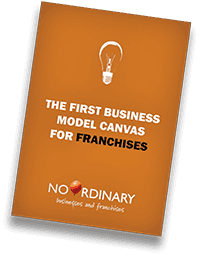Do you have what it takes to be a franchisor
DO YOU HAVE WHAT IT TAKES TO BE A FRANCHISOR (EVEN IF YOU ALREADY ARE ONE)?
DO YOU HAVE WHAT IT TAKES TO BE A FRANCHISOR (EVEN IF YOU ALREADY ARE ONE)?
There’s been a lot written about leadership. But there hasn’t been so much written about franchise leadership. Is that because there’s no difference between leading a franchise and leading any other type of business? Ask anyone like me who has been involved in both and you'll get the same answer. So what special skills are required for franchise leadership and how can you develop these?

Effective leadership is important in most business models, but perhaps none more so than franchising. After many years working with franchise systems of all types, Australian psychologist and franchise guru Greg Nathan believes that the difference between success and failure boils down to leadership as the single critical factor.
“When you strip away the apparent cause of every significant achievement or problem there is always one driving force — effective leadership or a lack of it,” he says in his article ‘Franchisor Leadership’.

Franchisor Leadership Success Secret #1: Lead on Two Different Levels
Nathan says the difference between franchisor leadership and traditional corporate leadership is that franchisor leaders have not one, but two distinct roles.
“They must first and foremost fulfil the traditional corporate leadership role, ensuring their organisation delivers on its promise to its customers, behaves in a responsible manner and makes money. But they must also play another role that is far less defined in its responsibilities — the franchisor role.”
One of the reasons the franchisor role is less defined is summed up by this nice statement quoted by Greg Nathan from a franchise CEO:
“I don’t manage franchisees, I coordinate the energy
of 120 Managing Directors!”
Franchisor Leadership Success Secret #2: Build a strong organisational culture of interdependence
Can you imagine trying to lead 120 Managing Directors? The phrase “like herding cats” comes to mind. The key to success in this, in our experience, is fostering a strong organisational culture based on mutual respect and the interdependent nature of the franchise relationship.
The problem many franchisors have with this is that they may have been brilliant at starting and building their own business, but being a franchisor isn't about that. Being a franchisor takes a different skillset. Being a franchisor is about being a leader’s leader, helping franchisees to work with the systems, the brand and each other to build their own business. More like a coach, a mentor, a consultant and a diplomat than a traditional corporate leader.
The difference is spelled out in a neat sentence from Joe Mathews and Thomas Scott in their article Why do Franchisors Fail?
“To succeed as a franchisor, the [business] must successfully transition its culture from that of a strong central authority where all decisions are made at the top to a more decentralized and empowerment culture where more decisions are made at street-level by the franchisee.”
An example of a franchise which has forgotten this principle, to its detriment, is McDonald’s. The global fast-food chain evidently tightened up its central authority in an effort to counter the effects of the global recession, greater competition and more health-conscious customers. In the face of the backlash from its franchisees, McDonald’s has been forced to hastily replace its CEO and promise to “listen more and assume less”.
Franchisor Leadership Success Secret #3: Stick to the standards but listen and be inclusive
In McDonald’s early days, things were different. Founder Ray Kroc may have been a dictator in his insistence on the highest standards of quality, service and cleanliness at McDonald’s restaurants – more than once when visiting franchisees, he got down on his knees in the carpark to scrape gum up with a putty knife – but he was also famous for listening to his franchisees – and acting on good ideas. Both the Big Mac and Egg McMuffin – still McDonald’s staples to this day – originated from franchisees.
Kroc has been described as “a leader driven by vision, but one willing to nurture talent and ideas not his own, a rare combination for an entrepreneur” by leadership coach John Baldoni in his case study Ray Kroc – A Salesman’s Leader.
Could Kroc’s success as a franchisor be partly attributed to the fact that he came from a background as a salesman, not a corporate leader?
Franchisor Leadership Success Secret #4: Instill your vision in others
Writers on franchise leadership almost always talk about the importance of having a vision, but even seasoned franchise experts such as consultant Mark Siebert and attorney Nicola Broadhurst sometimes neglect to mention that, in franchising, having the vision isn’t enough. You need to be able to instil that vision in others, to get them to believe in your business almost as much as you do.
Franchisor Leadership Success Secret #5: Focus on mutual gain
Franchising is different from many other business models in that it’s about relationships, specifically franchisor-franchisee relationships. The key to maintaining these relationships – apart from mutual respect – is mutual gain. It’s an old adage in franchising that the franchisor can’t be successful unless the franchisees are successful, but it’s also true that a franchisor’s definition of success is different from a franchisee’s. Because the franchisor’s income comes from a percentage of the franchisee’s revenue, success for the franchisor is about maximising that revenue. But for the franchisee, strong revenue doesn’t necessarily mean strong profitability, so success is very much about how much of their revenue they get to keep – in other words, what their net profitability is. The economics of franchising can create tension between the franchisor and franchisee.
The solution is for the franchisor to focus on mutual gain – that is, the franchisee’s profitability as well as the franchisor’s profitability. Underpinning this in best-practice franchises is a strong understanding of the key value drivers at all levels of their industries. These franchisors simply understand their franchisees’ businesses better than their franchisees do, using company-owned stores, real-time franchisee performance monitoring, customer satisfaction surveys and an array of other tools to build their understanding.
Ray Kroc took this a step further. He truly believed in the philosophy of putting franchisees’ profits first. He originally started out by charging franchise royalties of just 1½% and refusing to charge any markup on equipment and supplies provided to franchisees, then wondered why he wasn’t making any money after selling his first 18 franchises. The business was only saved by the timely hiring of Harry Sonneborn, who came up with the idea of building McDonald’s restaurants and leasing them back to franchisees. The idea provided McDonald’s with the extra income it desperately needed to survive.
Franchisor Leadership Success Secret #6: Manage tension
A while back I wrote an article entitled Is Conflict Inevitable In Franchising? I talked about the economics of franchising and the tension created by the different ways franchisors and franchisees make money. I talked about the tension created by the dichotomy of franchisees being required, on the one hand, to be independent entrepreneurs but on the other, to comply with the franchisors’ systems. As you’d expect, these tensions have the potential to cause a fair amount of conflict. In fact, one in five New Zealand franchisors reported in a recent survey that they were involved in disputes with franchisees.
It may never be possible to completely eliminate conflict from franchising but franchisors can go a long way toward reducing it by working in a spirit of collaboration with franchisees and actively managing the tensions that naturally exist.
Franchisor Leadership Success Secret #7: Innovate with franchisee buy-in
Nicola Broadhurst of law firm Stevens & Bolton in her article What Makes a Great Franchise Leader? claims that franchisors need to embrace change. Yes, they do. But we like Ed Teixeira’s phrase in his article What Makes an Effective Franchise Leader? better: “Innovate with franchisee buy-in”. Just as vision is useless in a franchise unless the franchisees share it, change is useless unless the franchisees buy in. Or better still, drive some of it themselves, as in the case of the invention of the Big Mac and Egg McMuffin.
Some of the services I offer for franchisors and franchise leaders:
- Executive mentoring
- Leadership coaching
- Business model evaluation and generation
- Strategy development
- Business improvement
- Systems and documentation development
- Training and support
- Conference speaking
- Workshop facilitation
Contact me
now for a free Initial Consultation in strictest confidence.
I'm Robin La Pere, no ordinary business expansion and franchise consultant. At different times, I've been a franchise manager, CEO of my own franchise business and franchise consultant. I know how different leading a franchise is from leading other types of businesses. And how many franchisors and franchise leaders don't seek help or support because, well, aren't they the ones who are supposed to provide help and support?
Studies show that business leaders with coaches and mentors tend to be more successful than those who don't — and the same goes for franchise leaders. So take advantage
of my free Initial Consultation to find out how I'm helping other franchise leaders to grow their skillsets as well as their businesses.
Relevant Articles
Download your free e-book
A major strength of franchising is that it’s based on tried and true business models. Trouble is, in this fast-changing business environment, what’s tried and true one year may be tired or irrelevant the next.
Not surprisingly, one out of three franchisors is concerned about the viability of their business model.
The 'Business Model Canvas' has emerged as a powerful tool for developing and updating business models. Recognising that franchise businesses differ in several ways from other business types, I have come up with a new version of the Business Model Canvas designed specifically for franchises.
Send me your email and I'll email you my e-book The Business Model Canvas for Franchisors:
First Business Model Canvas for Franchisors ebook
Thank you for downloading your free ebook The Business Model Canvas for Franchisors.
Enjoy!
Oops, there was an error sending your message.
Please try again later
Please try again later
Subscribe to my newsletter
Every two weeks, I write an email newsletter designed for those in franchising and those considering getting into franchising. Topics include those you see in the articles listed above and are intended to be stimulating, helpful and challenging. These articles have helped me gain more than 100,000 followers on Twitter and worldwide connections on LinkedIn, but you can read them first by subscribing to the newsletter.
Subscribe by entering your email address here:
Contact Us
Thank you for subscribing to my franchising newsletter. You'll receive your first issue in your inbox shortly.
Oops, there was an error sending your message.
Please try again later
Please try again later
WHO AM I?
My name is Robin La Pere. I’m a business, franchise and marketing consultant with real
experience in these fields and a proven background in helping my clients to futureproof, grow or franchise their businesses. I offer a free Initial Consultation so we can get to know each other before we make the decision to work together.
Download your free e-book
LET’S GET STARTED!
Check out my Free Resources
Subscribe to my Free Email Newsletter
Schedule your Free Consultation


